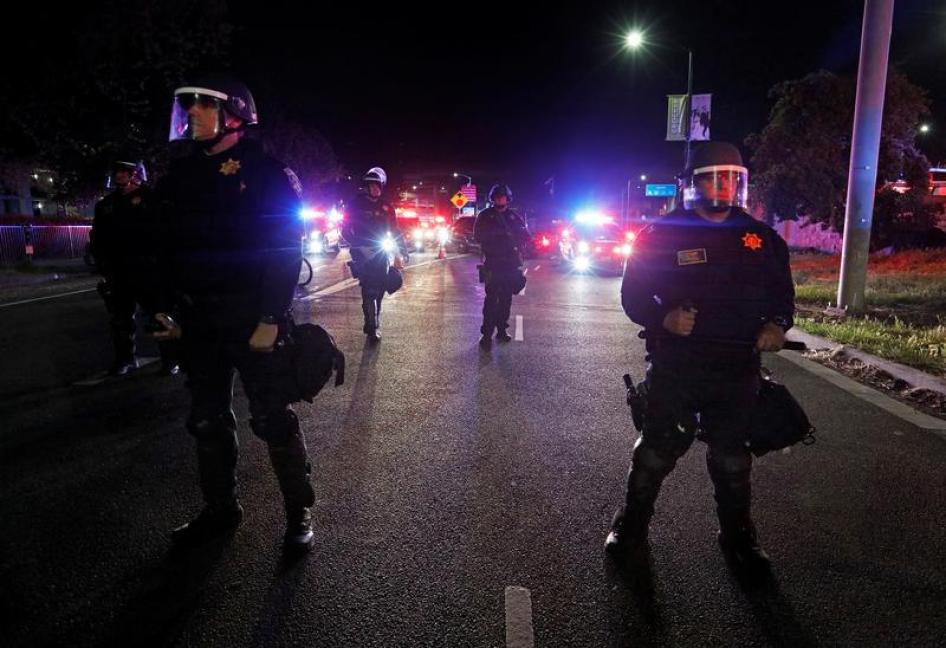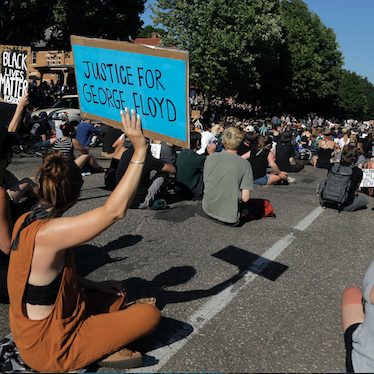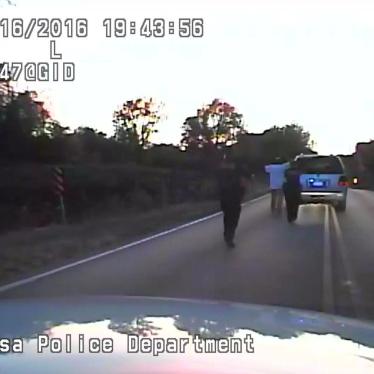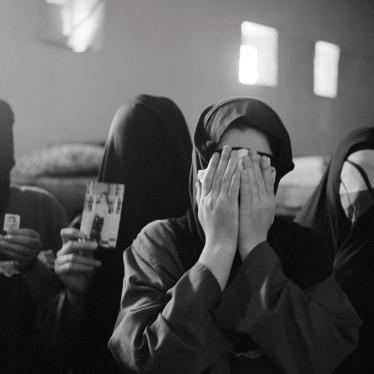(Washington, DC) – Government officials in the United States responsible for police policy and practice should reject a new campaign called #8CantWait that proposes only minor and ineffectual changes, Human Rights Watch said today. They should instead adopt meaningful reforms that will ensure police are held to account and reduce the police footprint, investing saved resources into services that improve access to housing, education, employment, and health care to address structural racism in the United States.
The hashtag #8CantWait is a list of policy proposals that would regulate some police behavior in certain instances without any enforcement mechanism. They include requiring officers to de-escalate situations; to intervene when other officers use excessive force; to give warnings before shooting when possible; to follow a “use of force continuum;” to exhaust all reasonable options before using deadly force; and to file reports for force incidents. They would ban chokeholds and shooting at moving vehicles. They rely almost entirely on police officers’ discretion and on departments policing themselves.
“The #8CantWait policing program is so superficial as to be meaningless,” said John Raphling, US criminal legal system researcher at Human Rights Watch. “It allows mayors and police chiefs to say they’re doing something without actually making the changes that are needed.”
As mass protests continue across the US following the killings of George Floyd, Breonna Taylor, and Ahmaud Arbery, many local government and police officials have embraced the #8CantWait program in responding to popular demands for substantial reform. The campaign’s marketing relies on questionable data analysis while touting endorsements from celebrities and politicians.
The #8CantWait program threatens to undermine the growing momentum in the US to fundamentally change policing and race relations, Human Rights Watch said. While they may sound promising, close examination reveals the proposed reforms to be ineffective and mostly dependent on an officer’s subjective interpretation of the situation.
For instance, a “use of force continuum” is a set of guidelines used by police to match a type of force with the behavior of the person they encounter. Human Rights Watch undertook a two-year investigation of policing, race, and poverty in Tulsa, Oklahoma – in many ways a microcosm of policing across the US – and found that the Tulsa Police Department continuum authorizes officers to use tasers, batons, dog bites, and pepper-ball launchers when an officer believes they are needed to control a person or overcome their resistance. The Tulsa policy states: “It is recognized that [the continuum] cannot be rigidly applied in rapidly unfolding and fluid situations. Officers should use the level of force which can reasonably be expected to succeed in controlling the situation.” So, the officer decides on the level of force needed.
With the #8CantWait, a decision not to de-escalate a situation, the failure to intervene in another officer’s actions, the resort to deadly force, and the decision not to give a warning before shooting, all depend on an officer’s interpretation of a situation and its later description in their report or further review. Many US police departments already have these types of highly discretion-dependent policies in place, and unlawful police use of force remains widespread. It is unrealistic to expect that expanding such policies will have significant impact.
Many of the #8CantWait policy provisions are already in effect in cities where police violence remains a problem. For instance, Cincinnati, Baltimore, and Chicago have seven of the eight proposals in place.
Minneapolis had four, including a requirement to de-escalate, a use of force continuum, and a policy requiring officers to intervene when a colleague uses excessive force. Yet Officer Derek Chauvin’s three partners took no action as he slowly killed George Floyd in plain sight as witnesses begged them to help. Louisville requires officers to exhaust all other means and to issue a warning before shooting, but still, on March 13, their officers shot and killed Breonna Taylor while executing a search warrant at the wrong house.
Even a ban on chokeholds will have little impact, as officers can use other techniques to inflict physical harm. Los Angeles has restricted chokeholds since 1982, nearly 10 years before the infamous Rodney King beating.
The #8CantWait program includes no accountability mechanism to enforce these highly discretionary policy changes. Police disciplinary procedures are notoriously lenient, generally allowing departments to investigate their own. Human Rights Watch’s review of data from Tulsa revealed that in 3,364 separate acts of force over a five-year period, the department found only two outside policy and even then imposed no disciplinary measures.
“A policing program like #8CantWait without means of enforcement is just empty words,” Raphling said. “The campaign’s tepid policy changes, with its underlying assumption that police remain the solution to societal problems, is a dangerous distraction.”
As public outrage grows over recent police killings and the aggressive tactics used against protesters, so have demands for more fundamental changes, especially lowering the power and footprint of policing and reinvesting resources into services and economic opportunities. Mayors in San Francisco, Los Angeles, and New York have vowed to reduce police funding and reinvest that money into economic development and services that help black and brown communities.
Human Rights Watch has previously called for prioritizing services and investment in community over investment in law enforcement, a stance consistent with calls to reduce the footprint of policing by defunding. Reliance on policing to address societal problems, like homelessness, mental illness, and poverty increases racial oppression and the prevalence of police violence. Human Rights Watch has called for reductions in unnecessary arrests and for decriminalization of conduct like drug possession and sex work.
“Community activists and organizers have been building momentum for years to re-envision public safety as separate from policing,” Raphling said. “At this critical moment, we need to focus on making real structural change and reducing the policing footprint.”








